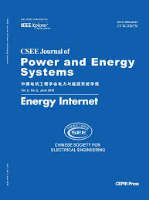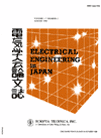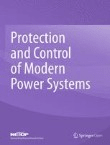
CSEE Journal of Power and Energy Systems
Scope & Guideline
Catalyzing Change in Energy Technologies
Introduction
Aims and Scopes
- Power System Resilience and Reliability:
Research in this area focuses on improving the resilience and reliability of power systems against various disruptions, including natural disasters and cyber threats. Studies often involve risk assessment methodologies, contingency planning, and the development of adaptive control strategies. - Integration of Renewable Energy Sources (RES):
This scope covers the challenges and solutions related to integrating renewable energy sources, such as wind and solar, into existing power grids. Topics include forecasting, grid stability, and management techniques for variable generation. - Smart Grids and Digitalization:
Research explores the application of advanced technologies, such as IoT, machine learning, and data analytics, in enhancing the operation and management of power systems. This includes smart grid technologies, real-time monitoring, and predictive maintenance. - Energy Storage Systems (ESS):
Studies focus on the role of energy storage systems in enhancing grid flexibility and reliability. This includes the design, optimization, and control of various storage technologies, such as batteries and pumped hydro storage. - Electric Vehicles and Transportation Electrification:
Research investigates the electrification of transportation systems, including the integration of electric vehicles (EVs) into the power grid. Topics include vehicle-to-grid technologies, charging infrastructure, and impact assessments on grid operations. - Power Quality and Control Techniques:
This area addresses the issues related to power quality in electrical systems, including voltage stability, harmonic distortion, and fault detection. Innovative control techniques and solutions are developed to mitigate these issues.
Trending and Emerging
- Decentralized Energy Management Systems:
Research is increasingly focusing on decentralized energy management systems that empower local communities and microgrids to optimize their energy resources. These systems enhance resilience and sustainability, providing a more localized approach to energy management. - Cybersecurity in Power Systems:
As power systems become more interconnected and reliant on digital technologies, the importance of cybersecurity has surged. Emerging research addresses vulnerabilities and protection strategies against cyber threats in energy infrastructures. - Data-Driven Approaches and AI in Energy Systems:
The integration of artificial intelligence and data analytics into energy systems is a rapidly growing area. Studies focus on leveraging big data for predictive maintenance, demand forecasting, and optimizing grid operations. - Hybrid Energy Systems and Multi-Energy Integration:
Research into hybrid energy systems that combine various energy sources (e.g., solar, wind, and storage) is on the rise. This includes the development of integrated systems that enhance efficiency and reduce carbon footprints. - Electric Mobility and Smart Charging Solutions:
With the rise of electric vehicles, research is increasingly focused on smart charging solutions and the integration of EVs into power systems. This includes vehicle-to-grid technologies and the impact of EV charging on grid stability. - Resilience-Oriented Planning and Control:
Emerging studies emphasize resilience-oriented approaches to planning and control in power systems, focusing on adapting to extreme weather events and other disruptions. This includes innovative modeling techniques and strategies to enhance system robustness.
Declining or Waning
- Traditional Fossil Fuel Technologies:
Research related to conventional fossil fuel technologies has diminished as the focus shifts towards renewable energy and sustainability. Studies that previously concentrated on optimizing fossil fuel generation are increasingly less relevant in the context of global energy transition. - Centralized Energy Systems:
There is a noticeable decline in research focused on centralized energy systems. The shift towards decentralized and distributed energy resources has led to less interest in traditional centralized power generation models. - Conventional Load Forecasting Techniques:
As more advanced methodologies, such as machine learning and AI-based forecasting, gain traction, traditional load forecasting techniques have become less prevalent in recent publications. The demand for innovative approaches to predict energy consumption has overshadowed conventional methods. - Overhead Transmission Systems:
Research on traditional overhead transmission systems has waned as the focus has shifted towards more advanced technologies such as high-voltage direct current (HVDC) systems, which offer better efficiency and control in modern power networks. - Static Models for Power System Analysis:
With the increasing complexity and dynamic nature of modern power systems, static modeling approaches have seen a decline. Researchers are now prioritizing dynamic and real-time models that can better reflect the operational realities of power systems.
Similar Journals

Electrical Control and Communication Engineering
Transforming ideas into impactful electrical engineering research.Electrical Control and Communication Engineering is a premier Open Access journal dedicated to the vibrant fields of electrical engineering, control systems, and communication technologies. Published by SCIENDO, this journal not only aims to disseminate significant research findings since its inception in 2012 but also fosters a collaborative platform for researchers, professionals, and students from around the globe. With its commitment to high standards and rigorous peer review, the journal seeks to advance the collective understanding of innovative technologies and methodologies in electrical control and communication systems. With an ISSN of 2255-9140 and an E-ISSN of 2255-9159, the journal is gaining visibility and impact within the academic community, encouraging open and accessible scholarship to drive progress in this critical sector. Housed in Warsaw, Poland, it is poised to be an invaluable resource for those engaged in cutting-edge research and applications in electrical and communications engineering.

Electrica
Driving innovation and accessibility in electrical research.Electrica is a prominent open access journal dedicated to advancing the field of Electrical and Electronic Engineering. Published by AVES since its inception in 2018, it has rapidly established itself as a crucial platform for disseminating high-quality research and innovative findings within the engineering community. With an ISSN of 2619-9831, Electrica operates under a rigorous peer-review process to maintain its scholarly integrity while promoting accessibility and knowledge sharing. Positioned in the third quartile of the 2023 rankings for Electrical and Electronic Engineering on Scopus, the journal has garnered a significant following, ranked #490 out of 797 in its category, reflecting its growing impact in the field. Researchers, professionals, and students can benefit from the wealth of resources available through this journal, as it not only provides a space for emerging ideas but also fosters collaboration and dialogue among experts. The journal's commitment to disseminating impactful research continues to shape the future of electrical engineering in Turkey and beyond.

TRANSPORTATION
Connecting Research with Real-World Transportation ChallengesTRANSPORTATION is a premier academic journal published by Springer, focusing on the dynamic and interdisciplinary field of transportation studies. Established in 1972 and set to release its latest findings through 2024, the journal has garnered a strong reputation, reflected in its impressive impact factor and Q1 quartile rankings across key categories including Civil and Structural Engineering, Development, and Transportation. With a robust Scopus ranking that places it in the top percentile of its fields (ranked #16/306 in Social Sciences - Development, #27/379 in Engineering - Civil and Structural Engineering, and #23/141 in Social Sciences - Transportation), "TRANSPORTATION" is crucial for researchers, professionals, and students alike who seek to expand their understanding of innovative transport systems, policies, and technologies. By offering in-depth research articles, reviews, and case studies, the journal serves as a vital resource for advancing academic knowledge and practical solutions in the transportation sector. Part of a thriving academic community, contributors and readers alike are encouraged to engage with the latest research to foster development in pressing issues related to mobility and infrastructure.

Smart Grids and Sustainable Energy
Catalyzing Change in Energy Economics and EngineeringSmart Grids and Sustainable Energy, published by SPRINGER NATURE, is a pivotal open-access journal dedicated to advancing the knowledge and application of smart grid technologies and sustainable energy solutions. Serving as a key resource in the fields of Economics and Econometrics, Electrical and Electronic Engineering, and Energy Studies, this journal aims to facilitate interdisciplinary collaboration and innovation. With a commendable Q2 ranking in multiple categories as of 2023, including a top percentile placement in Economics and Econometrics and Electrical Engineering, the journal underscores its significance in driving forward research that combines economic viability with technological advancement. Researchers, professionals, and students will find a wealth of scholarly articles designed to expand understanding of the complex interplay between energy systems, sustainability, and economic factors. For those interested in cutting-edge research with high visibility due to its open-access policy, Smart Grids and Sustainable Energy is an essential addition to the academic landscape.

ELECTRICAL ENGINEERING
Pioneering Research for a Connected WorldELECTRICAL ENGINEERING is a distinguished journal published by Springer that addresses the multifaceted challenges and advancements in the field of electrical and electronic engineering. With an impact factor that reflects its significance in the academic community, this journal offers vital insights into emerging technologies and groundbreaking research findings. Operating without open access, it provides a platform for rigorous peer-reviewed articles that span from applied mathematics to engineering disciplines. The journal has established a strong reputation, ranking in the Q2 category for Electrical and Electronic Engineering and Q3 for Applied Mathematics as of 2023, which showcases its commitment to high-quality research. The journal is indexed in Scopus, placing it within the 53rd to 71st percentiles in its respective categories. Researchers, professionals, and students alike will find ELECTRICAL ENGINEERING an invaluable resource for staying abreast of innovations and developments that shape the future of the electrical engineering landscape.

ELECTRICAL ENGINEERING IN JAPAN
Shaping the Landscape of Electrical TechnologyELECTRICAL ENGINEERING IN JAPAN is a leading academic journal published by Wiley, dedicated to advancing the field of electrical and electronic engineering as well as energy engineering and power technology. With an ISSN of 0424-7760 and an E-ISSN of 1520-6416, this journal has been a vital resource since its inception in 1968, appealing to a diverse audience including researchers, professionals, and students interested in the latest innovations and developments within the field. Despite currently holding a Q4 ranking in both Electrical and Electronic Engineering and Energy Engineering and Power Technology categories, the journal remains committed to disseminating significant research that contributes to technological advancements. Although it does not offer Open Access options, articles are peer-reviewed to ensure academic rigor and integrity. With each publication, ELECTRICAL ENGINEERING IN JAPAN continues to play an essential role in fostering a deeper understanding of the engineering landscape, ultimately helping to shape the future of electrical engineering on a global scale.

IEEE Open Access Journal of Power and Energy
Exploring the Future of Energy Through Open Access KnowledgeIEEE Open Access Journal of Power and Energy is a leading scholarly publication dedicated to advancing research and innovation in the fields of electrical and electronic engineering as well as energy engineering and power technology. Published by the prestigious IEEE-INST ELECTRICAL ELECTRONICS ENGINEERS INC, this fully open-access journal has been a vital resource for the dissemination of impactful findings since its establishment in 2020. With an impressive Q1 ranking in both Electrical and Electronic Engineering and Energy Engineering and Power Technology, it has garnered recognition for its rigorous peer-review process and quality content. Moreover, it ranks favorably within the top percentiles of Scopus, acknowledging its contributions to the global discourse on energy solutions. The journal offers unique access options that encourage broader readership and collaboration among researchers, professionals, and students eager to explore the latest advancements in power and energy systems. Located in the United States, this journal plays an essential role in shaping the future of sustainable energy and technological innovation.

University Politehnica of Bucharest Scientific Bulletin Series C-Electrical Engineering and Computer Science
Fostering Groundbreaking Discoveries in Electrical EngineeringThe University Politehnica of Bucharest Scientific Bulletin Series C-Electrical Engineering and Computer Science is an esteemed academic journal dedicated to advancing knowledge in the fields of electrical engineering and computer science. Published by POLYTECHNIC UNIV BUCHAREST, this journal serves as a vital platform for researchers and professionals to share their innovative findings and insights. With an ISSN of 2286-3540 and an E-ISSN of 2286-3559, it has been a beacon of scholarly communication since its inception in 2008. Though currently categorized in Q4 in Electrical and Electronic Engineering, the journal is committed to enhancing its impact within the academic community and industry by fostering research that bridge gaps between theory and practical application. Operating from Romania, the journal emphasizes open access for its readership, ensuring wide dissemination of its content. Researchers, professionals, and students are encouraged to contribute and explore groundbreaking studies, as this journal aims to elevate the discourse and innovation in engineering and computer science.

Protection and Control of Modern Power Systems
Innovating Protection and Control in Power Systems.Protection and Control of Modern Power Systems, published by SPRINGER SINGAPORE PTE LTD, is an influential open-access journal dedicated to the field of power systems engineering. With its ISSN 2367-2617 and E-ISSN 2367-0983, the journal has established itself as a pivotal platform for sharing cutting-edge research and advancements since its inception in 2016. Hailing from Singapore, it boasts a commendable Q1 ranking in multiple categories, including Electrical and Electronic Engineering, Energy Engineering and Power Technology, and Safety, Risk, Reliability and Quality, highlighting its significant impact and reach within the scientific community. Covering essential topics such as power system protection, control strategies, and risk management, the journal serves as a vital resource for researchers, professionals, and students alike, promoting innovative solutions to contemporary energy challenges. The journal leverages an extensive Scopus ranking that places it within the top percentile of its categories, ensuring it remains a key contributor to the discourse on modern power systems.

Archives of Electrical Engineering
Connecting Theory with Practice in Electrical EngineeringArchives of Electrical Engineering, published by the Polish Academy of Sciences, is an esteemed journal dedicated to advancing the field of electrical and electronic engineering. With an ISSN of 1427-4221 and an e-ISSN of 2300-2506, this open-access journal has been providing an important platform for scholarly communication since its transition to open access in 2010, ensuring wide dissemination and accessibility of research findings globally. The journal covers a diverse range of topics within the electrical engineering domain and is recognized for its contribution to both theoretical and practical advancements in the field, as evidenced by its Q3 ranking in the 2023 category of Electrical and Electronic Engineering. It currently holds a Scopus rank of 471 out of 797, placing it in the 40th percentile. Researchers, professionals, and students are invited to explore cutting-edge research, innovations, and insights published in this pivotal journal that bridges the gap between academic excellence and industry application.